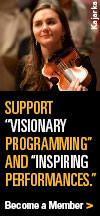Feature Preview by The Record (Bergen)
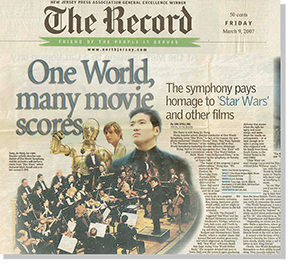 One World, Many Movie Scores:
One World, Many Movie Scores:
The Symphony pays homage to 'Star Wars' and other films
by Ian Spelling
The Force is with Sung Jin Hong.
Hong, founder-artistic director-conductor of One World Symphony, loves Star Wars. In fact, at his request, the symphony performed "Anakin's Theme," from Star Wars Episode I: The Phantom Menace, at his wedding last fall to One World Symphony marketing director Adrienne Metzinger-Hong. And so it's only appropriate that Star Wars will play a prominent role in "One World Strikes Back: Music From Hollywood Films," to be performed by the symphony on Sunday at Town Hall...
Read the full article here:
https://www.highbeam.com/doc/1P1-135855995.html
One World Symphony Performs At The Town Hall To Capacity Audiences
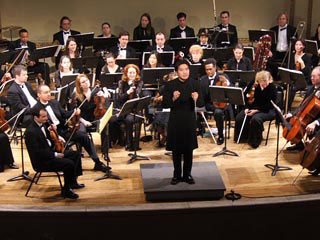 |
| Conductor Sung Jin Hong interacts with audience members and demonstrates sections of The Firebird to illustrate this Russian folk-tale |
On March 11, 2007, One World Symphony made a triumphant return to The Town Hall under the leadership of conductor Sung Jin Hong, thrilling a capacity audience with selections from film scores from Hollywood. After One World Symphony's sold-out debut at The Town Hall in March 2006, the symphony was re-engaged to present a program that encompassed rarely performed excerpts from "Vertigo" and "North by Northwest," "The Firebird" from Fantasia 2000, musical theatre standards from "South Pacific" with soloists Amy Forburger and Doug Jabara, and a grand tour of John Williams' popular Star Wars scores.
Artistic director Hong engaged and surprised the enthusiastic audience in various ways. He interacted with the audience members by taking the time to demonstrate and explain different stylistic interpretations of specific sections of The Firebird. In the second half of the program, the crowd broke into cheers when Maestro Hong arrived on stage in a Jedi/Sith cloak to conduct Star Wars. Supported by a 40 vocal artists hidden in the audience, One World Symphony performed the New York Premiere of "Duel of the Fates" from Star Wars, Episode 1. After performing Anakin, Darth Vader, and Yoda themes and the main title sequence, the concert concluded with the Throne Room and End Title music as an encore with an emotional light saber salute from the fully costumed New York Jedi.
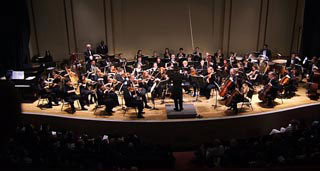 |
| One World Symphony performing at The Town Hall, March 11, 2007 |
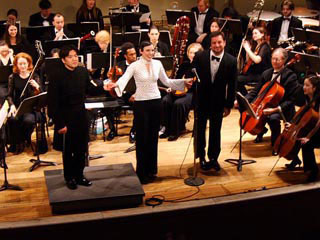 |
| Amy Forburger as Nellie Forbush and Doug Jabara as Emile de Becque take their bows after the South Pacific selections |
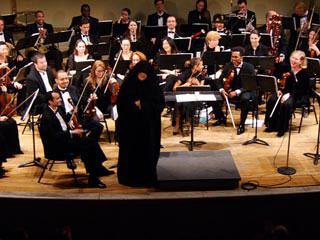 |
| Conductor Sung Jin Hong makes a surprise entrance and the audience goes wild! |
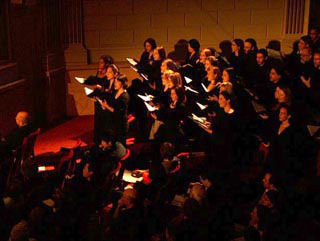 |
| Forty vocal artists join One World Symphony giving the New York Premiere of Duel of the Fates from Star Wars Phantom Menace |
Reposted with permission from Classical Domain
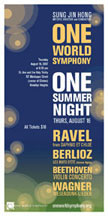 One Summer Night
One Summer Night
A summer program from One World Symphony, featuring works by: Berlioz, Ravel, Beethoven and Wagner. With soloists Adrienne Metzinger, Jon Morrell, under conductor Sung Jin Hong.
By Gregg Deering
In the summer there are various ways to create definitive "summer" programs, starting with trout and dumkys (Schubert and Dvorak) or standards like Tchaikovsky and fireworks. Rarely does a program for the summer seem as perfect as the one that Sung Jin Hong, has created for One World Symphony. A program written for voice and orchestral accompaniment that captures the feelings of passion, melancholy and languor of summer. One based more on association of intimacy and beauty than declamatory statement.
Based on a set of six poems written by Théophile Gautier, initially written for piano and later orchestrated, Gautier described the poems and the effect of Berloz's orchestrations as "Amorous or melancholy dreaminess, longings and questionings of the soul."
Ravel's complete Daphnis et Chloe is considered his masterpiece. Igor Stravinsky called Daphnis et Chloe "...not only Ravel's best work but one of the most beautiful products in all of French music. " The second suite is the most common way to sample this great work.
Finally the Wesendonk Lieder is Wagner's orchestral elevation of love poems written by his mistress, the wife of one of his chief benefactors -- just your typical summer movie fun.
According to Sung Jin Hong: "There aren't any signs of virtuoso showmanship, but deep and meaningful music. All the solo 'voices" and the orchestra are intimately connected. They are never playing or singing over each other. Instead, the solo voice comes from the orchestra and vice-versa.
"If there's any common undercurrent in our encore program, it's the way each composer has treated the solo 'voice.' Whether it's the flute solo in Ravel's Dapnhis, solo violin part in Beethoven's concerto, or the songs by Berlioz and Wagner, each composer employs the solo part with utmost sensitivity and tenderness.
"Since there isn't any element of bravura in the solo voices, all the solo voices have a sense of mystery. What's really happening when the flutist is playing her solo in Ravel's Daphnis? Is it simply an accompaniment for a staged ballet or is it depicting Daphnis's foreplay preparing for the arousing Bachanale? Beethoven was a master of creating and developing motifs, and his violin concerto's opening five notes permeate throughout the work. What human emotion is the five-note motif expressing? In both Berlioz and Wagner's moving song cycles, the solo voices and the orchestra simultaneously share conflicting feelings of sad serenity and longing passion. "




